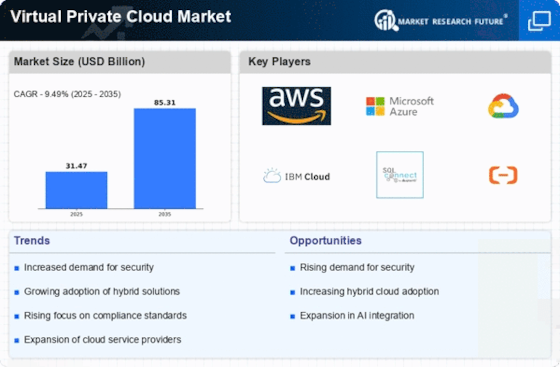Virtual Private Cloud Market Highlights:

Competitive landscape of the Virtual Private Cloud (VPC) marketThe global virtual private cloud (VPC) market is characterized by intense competition among a diverse group of providers. The top players in this market include Amazon Web Services (AWS), Alibaba Cloud, Microsoft Azure, VMware, and IBM. These companies have established themselves as leaders by offering a comprehensive suite of VPC services, including infrastructure, networking, security, and management tools.
Key Players in the VPC Market
- IBM Corporation (U.S.)
- Microsoft Corporation (U.S.)
- Amazon Web Services (U.S.)
- HP (U.S.)
- Google, Inc. (U.S.)
- VMware, Inc. (U.S.)
- Red Hat, Inc. (U.S.)
- NetApp, Inc. (U.S.)
- Oracle (U.S.)
- Cisco Systems, Inc. (U.S.)
Strategies Adopted by VPC Providers
The leading VPC providers employ a variety of strategies to compete in the market. These strategies include:
- Offering a broad range of features and services: The top VPC providers offer a wide range of features and services, including networking, security, management tools, and integration with other cloud services.
- Building a strong global network: The leading VPC providers have a strong global network of data centers, which allows them to deliver their services to customers around the world.
- Focusing on price and performance: VPC providers compete on price and performance, and they regularly update their offerings to meet the needs of their customers.
- Investing in innovation: The leading VPC providers are constantly investing in new technologies and features, in order to stay ahead of the competition.
Factors for Market Share Analysis
Market share analysis for the VPC market is complex, and it is important to consider a variety of factors. These factors include:
- Revenue: Revenue is a key metric for measuring the size and growth of the VPC market.
- Customer base: The number of customers using a VPC provider's services is a good indicator of its market share.
- Geographic reach: The geographic reach of a VPC provider's network is important for understanding its global market share.
- Product offerings: The breadth and depth of a VPC provider's product offerings can influence its market share.
- Pricing: Pricing is a key factor in the competitive landscape of the VPC market.
- Performance: The performance of a VPC provider's services can influence its market share.
New and Emerging Companies
The VPC market is constantly evolving, and there are a number of new and emerging companies that are challenging the established players. These companies are typically offering niche products or services, or they are targeting specific customer segments.
Current Company Investment Trends
The leading VPC providers are investing heavily in a number of areas, including:
- Network expansion: VPC providers are expanding their global network of data centers to meet the growing demand for their services.
- New product development: VPC providers are developing new products and services to meet the evolving needs of their customers.
- Cloud security: VPC providers are investing in cloud security to protect their customers' data.
- Artificial intelligence (AI) and machine learning (ML): VPC providers are using AI and ML to improve the performance and efficiency of their services.
Updated News:Date: 2023-10-04
News: Amazon Web Services (AWS) announced a new service called AWS PrivateLink that allows customers to securely connect their VPCs to AWS services without exposing them to the public internet.
Date: 2023-09-22
News: VMware announced a new product called VMware Cloud on AWS that allows customers to run their VMware workloads on AWS infrastructure.
Date: 2023-08-17
News: Microsoft Azure announced a new service called Azure Virtual WAN that allows customers to centrally manage their VPN and SD-WAN connections.










